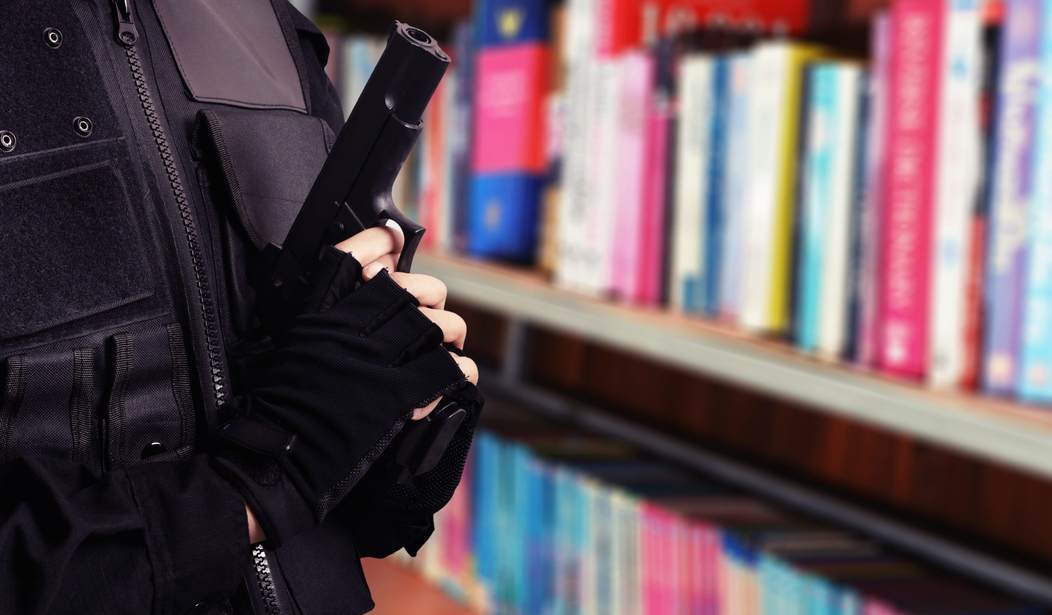In South Carolina, a high school girl was grabbed by a county sheriff’s deputy who was working as a school resource officer. He flipped over her desk and then dragged the girl out of the classroom, all because she wouldn’t put away her cell phone.
Another student who spoke out in her defense was arrested and still faces a misdemeanor charge.
Opponents of the concept of putting armed police in America’s schools say it has done nothing to improve the safety of America’s classrooms but instead has opened a criminal schoolhouse-to-jailhouse pipeline through which children wind up in prison for the mere crime of acting like children.
The idea of putting armed police in the hallways of America’s schools was one of the few brainstorms on which the Obama administration and the National Rifle Association found themselves in agreement.
Following the Sandy Hook school massacre, the NRA called for armed guards in every school and started a program to help train those guards for working with public schools.
“The only thing that stops a bad guy with a gun is a good guy with a gun,” said NRA executive vice president Wayne LaPierre.
President Obama shifted $45 million in federal funding to help schools pay for cop patrols.
“In the wake of past tragedies, it’s clear that we need to be willing to take all possible steps to ensure that our kids are safe when they go to school,” Attorney General Eric Holder said back then.
“Especially in a time of increased challenges and limited budgets,” Holder said, “our top priority must always be the safety and well-being of our children.”
America’s largest teachers union, the National Education Association, supported the Obama plan.
However, many educators and civil-rights advocates now think what seemed like a good idea at the time has boomeranged against the best interests of those it was meant to protect.
In South Carolina, the sheriff’s department whose deputy tossed the student with a cell phone across a classroom has signed an agreement with the U.S. Justice Department.
It requires Richland County to provide training for deputies who are working in more than five dozen schools on how to handle misbehaving students. It also mandates that the officers will not be involved in “classroom management or school discipline matters that should be appropriately handled by school staff.”
Good enough?
No, says the ACLU of South Carolina, which argued the problem is not just cops in schools but legislation that criminalizes student behavior when kids act like kids in class.
The ACLU filed a federal lawsuit Aug. 11 that charged hundreds of children, some as young as 7 years old, are being treated as criminals because they misbehaved in South Carolina schools. The list of illegal actions included loitering, cursing or undefined “obnoxious” behaviors.
It’s all covered by the Disturbing Schools statute, which was written in 1917 and updated in 1976.
It was originally intended to protect girls’ schools from trespassers, Jay Elliot, an attorney and former police officer, told the Post and Courier.
“Now in our more contemporary age, these same laws are used to essentially arrest kids — disproportionately black kids — for acting up in school,” Elliott said.
However, then-South Carolina Attorney General Travis Medlock wrote in 1994 that police should be able to arrest students if they fought at school, refused to leave the campus or cursed at a police officer or school official.
“Emphasis by school officials should be on using existing laws to make the school safe, not just in name, but in fact,” Medlock wrote.
“That includes every classroom, every hallway, each restroom, all gyms and parking lots. Fighting constitutes disrupting a school and is against State law. Failure to leave a school campus when directed to do so by a principal is against State law, too. So is using foul or abusive language against a teacher, staff member or police officer,” Medford added.
The American Civil Liberties Union of South Carolina doesn’t see it that way.
In addition to the Disturbing Schools statute, the ACLU has challenged South Carolina’s disorderly conduct law, which prohibits students from acting in a “disorderly or boisterous manner.”
“Students are being channeled into the criminal justice system for regular adolescent behavior that schools have dealt with for generations. This shift toward criminalization is hurting young people, particularly students of color,” said ACLU attorney Sarah Hinger.
Niya Kenny, the girl who started praying out loud as her classmate was flipped over her desk and dragged out of a Spring Valley High School classroom, is one of the plaintiffs in the case.
Hinger said a criminal charge in school makes it more likely that a student will not graduate from high school. And rather than becoming a law-abiding adult, the criminal charge “channels them into the criminal justice system.”
Kenny was arrested and spent a night in a juvenile detention center.
“After my experience, I felt humiliated and fearful of returning to school. I felt a lot of anxiety. It was a very difficult decision, but I decided not to return to Spring Valley High School,” said Kenny, who withdrew from school and entered a G.E.D. program.
The ACLU has challenged the South Carolina statutes for violating the U.S. Constitution’s due process protections.
“The bottom line is that the state has imposed an impossible standard for schoolchildren to follow and for police to enforce with any consistency or fairness,” said Shaundra Scott, executive director of the ACLU of South Carolina. “This shift toward criminalization is hurting young people, particularly students of color.”
However, Medlock wrote in 1994 that even though the Disturbing Schools statute might be outdated, “If these laws are used forcefully, firmly and fearlessly, they will greatly help to make schools the safe zones we need.”









Join the conversation as a VIP Member